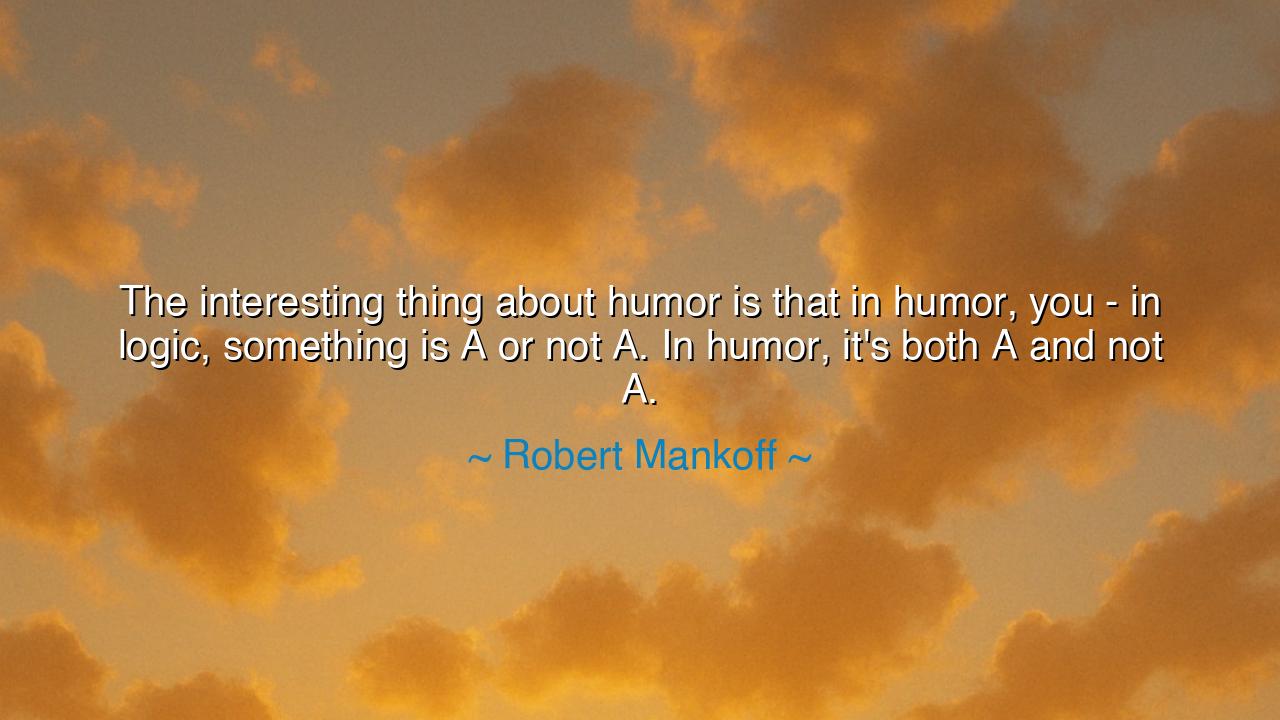
The interesting thing about humor is that in humor, you - in
The interesting thing about humor is that in humor, you - in logic, something is A or not A. In humor, it's both A and not A.






When Robert Mankoff declared, “The interesting thing about humor is that in humor, you—in logic, something is A or not A. In humor, it’s both A and not A,” he was pointing to one of the oldest mysteries of the human mind: that truth is not always singular, and that sometimes, two opposites can coexist and both be true. Logic divides the world into sharp lines—right or wrong, yes or no, being or not-being. But humor transcends this narrow order. It dwells in the sacred paradox where contradiction becomes harmony. Mankoff’s insight reveals that laughter is not mere frivolity; it is a profound recognition of life’s complexity—a bridge between the rational and the real, between what we know and what we feel.
In the ancient world, this duality was revered as the essence of wisdom. The philosopher Heraclitus of Ephesus taught that the universe is sustained by tension, that “the path up and the path down are one and the same.” He saw that opposites do not destroy each other—they define each other. So too in humor: it is the friction of contradiction that sparks laughter. When something is “both A and not A,” it unsettles the logical mind but delights the soul, for the soul understands that life itself is filled with such contradictions. We are both fragile and strong, foolish and wise, joyful and grieving. Humor, like Heraclitus’s fire, burns in that very tension—it illuminates the truth that the heart already knows but reason cannot quite hold.
The origin of Mankoff’s thought comes from his work as a cartoonist and editor for The New Yorker, a place where humor and intellect intertwined like dancers in an eternal paradox. He observed that the best jokes, the most memorable cartoons, do not simply make us laugh—they make us think. They expose the cracks in logic and the absurdities of life, not to mock them, but to reveal their humanity. In logic, contradiction is error; in humor, contradiction is revelation. A man says one thing and means another; a truth is spoken through a lie; a tragic truth is softened by a laugh. This is the alchemy of humor—it turns the rigid iron of certainty into the living gold of understanding.
Consider the story of Charlie Chaplin, the silent clown of the modern age. He was at once comic and tragic, both A and not A. Dressed in his shabby bowler hat, he stumbled through poverty and humiliation, yet his misfortune made the world laugh. How strange, that suffering could give birth to joy! But that is the heart of Mankoff’s truth—humor lives in contradiction. Chaplin made the unbearable bearable, showing that pain and laughter are not opposites but twins. When we laugh at his falls, we are not mocking him; we are recognizing ourselves. Humor becomes a mirror in which both the sorrow and the beauty of life are reflected at once.
And so, humor is not the enemy of logic, but its liberation. It frees us from the tyranny of certainty, teaching us that it is possible to live gracefully amid contradiction. The world of logic says, “Choose.” The world of humor says, “Accept.” It is through this acceptance that peace is born. For what is laughter, if not the soul exhaling in relief at the absurdity of existence? The wise laugh not because they do not understand life, but because they understand it too well. They see that to live fully, one must learn to dance between A and not A, between hope and despair, order and chaos, meaning and nonsense.
The ancients themselves used humor as a tool of enlightenment. Diogenes the Cynic, who mocked the vanity of men and the pomp of philosophers, wielded irony as a sword of truth. When Alexander the Great offered him any gift he wished, Diogenes replied, “Stand out of my sunlight.” The crowd laughed, but in that laughter lay recognition—power and humility, greatness and absurdity, both existing together. Humor, then, becomes a divine paradox: it humbles the proud and comforts the broken, reminding both that life is too immense to fit within the small cage of logic.
The lesson we must take is this: embrace paradox, for it is the essence of wisdom. When you find yourself trapped between contradictions—between love and loss, success and failure, faith and doubt—do not despair. Smile. Laugh softly. See that the universe itself is built upon the meeting of opposites: day and night, life and death, joy and sorrow. Learn to see the comedy hidden within the chaos. Let your laughter be the sign that you have seen both sides of truth and chosen neither, but accepted both.
For Robert Mankoff’s insight is not merely about jokes—it is about how to live. Life is not logical, yet it is meaningful. It is filled with contradiction, yet it moves with divine order. To live only in logic is to be imprisoned by “A or not A.” But to live with humor is to be free—to hold both, and to find joy in their dance. Therefore, be like the wise of old: walk between opposites with laughter as your lantern, and you will discover that in the heart of contradiction lies not confusion—but enlightenment.






AAdministratorAdministrator
Welcome, honored guests. Please leave a comment, we will respond soon